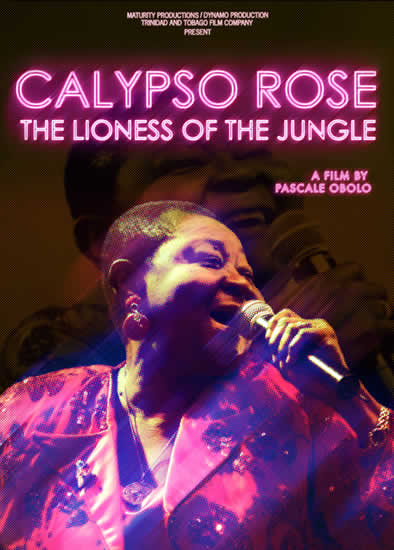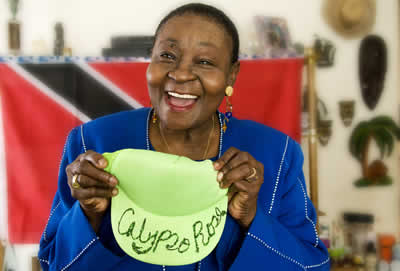 “Calypso Rose – The Lioness of the Jungle” is as much an intimate portrait about the “Grande Dame” of Calypso as it is a road movie. Travelling from Trinidad and Tobago to New York, Paris, all the way to Africa. Along the way, Calypso Rose reveals her personal story, her groundbreaking musical achievements, her commitment to defend women´s rights, her faith, her worries and fears and above all her strong love of life and people.
“Calypso Rose – The Lioness of the Jungle” is as much an intimate portrait about the “Grande Dame” of Calypso as it is a road movie. Travelling from Trinidad and Tobago to New York, Paris, all the way to Africa. Along the way, Calypso Rose reveals her personal story, her groundbreaking musical achievements, her commitment to defend women´s rights, her faith, her worries and fears and above all her strong love of life and people.
For the past 16 years, Jean Michel Gibert has been working in Trinidad and Tobago as an executive producer and producer for films such as “Calypso Roots”, “Panman” (For Canal Plus ) “Calypso @ Dirty Jim’s”, “Soca Power in Trinidad and Tobago”, “Calypso Rose Lioness of the jungle” and many international productions. He founded his production company Maturity Productions in 2001 to further promote Caribbean cinema through international co-productions and qualitative and recognized multimedia projects.( www.calypso-at-dirty-jims.com and www.calypsorosediva.com )
Bijan Tehrani: Please tell me how you encountered the subject for this film and how did you go about producing Calypso Rose, The Lioness Of The Jungle?
Jean Michel Gibert: The idea for Calypso Rose The Lioness of the Jungle started in 2005 while we were producing Calypso @Dirty Jim’sss, with French co-producer Philippe Djivas of Dynamos Productions and French-Cameroon filmmaker Pascale Obolo. Pascale, and Calypso Rose, who was one of the music stars featured in the film, hit it off right away and become very close during the making of that documentary. The two formed a kind mother-daughter relationship. Calypso Rose is an engaging and exciting character with a very strong story to tell. Pascale felt that Rose would make a compelling subject for a feature length documentary and so she decided to make a film that goes well beyond Rose’s success as a musician and performer and also looks at the entire life of this Caribbean woman.
BT: You mentioned the film is not only about the music and about Rose the star, but also about the impact of her music on generations. In addition the film also addresses the tragedies in her life. How  challenging was it to make this film?
challenging was it to make this film?
JG: The film is about a unique human being that transcends race, gender, generations and cultures. And it is not a music film – Rose’s music is just one aspect of this film. She is the queen of Calypso Music, an art form that started the beginning of the century. From Calypso Rose herself we learn about the changing role of women in society, her idea of spirituality as spiritual Baptist, her return to Africa, her immigration to the US, her relationships with men as a woman in a man’s world and of course a black woman in the music world. The films focuses on these different themes in different locations – and we are taken on a road trip starting in France where Rose is recording her latest album. Next we travel with her to Tobago where she was born and then to Trinidad where she started her career and later to the US, her home of choice – where she immigrated and now lives and finally back to Africa to at Ouidah in Benin, the land of her ancestors, and the first former center of the slave route. The different location supported Rose’s story and made it easier for her to open up. It was a slow process and it was thanks to Pascale who created a very safe and secure atmosphere for Rose to tell her story. And what we understand at the end of the film is that although hugely successful, Rose’s life is very lonely and she really comes alive when she performs in the different concert halls around the world.
BT: What was Calypso Rose’s reaction to the film?
JG: Rose has completely embraced the film. She sings and claps along during the screening of it. And I have noticed other interesting things. After she watched the film, Rose now talks about stories that are part of the film during her performances. She never did this  before; it is as if she is reprocessing her life through the movie, as if she is rediscovered herself.
before; it is as if she is reprocessing her life through the movie, as if she is rediscovered herself.
BT: What has been the audineces ‘ reaction so far?
JG: We wanted to premiere the film in Rose’s birthplace, the tiny island of Tobago. And so we arranged for a screening in collaboration with the Tobago House of Assembly. The audience loved the movie! The second place we screened the film was in Trinidad where we had a really big premiere in collaboration with Trinidad and Tobago Film Company, Trinidad and Tobago Entertainment Company and the Ministry of Culture. Again it was a huge success. We then moved to Europe and had a screening followed by a performance of Rose on the beach of the Croisette at the Cannes Film Festival this May. The event was very well received and we had very good reviews by the French press. The next screening will be on September 7th during the Toronto Film Festival at the Harbor Front. Rose will be there to talk about the film. Meanwhile the US TV rights of the film were acquired by the National Black Programming Consortium, thanks to our US co-producer Tanja Meding and they are planning to release the film on PBS in early 2012 as part of their AfroPoP series. Furthermore we are planning a US premiere in New York towards the end of the year. And finally, the film will be presented during WOMEX, the World Music Exhibition, and the world’s number one forum dedicated exclusively to world music in Copenhagen
BT: Thank you a lot for your time and best of luck with your film!
For more information on Calypso Rose, her music and the film, please visit: www.calypsorosediva.com

